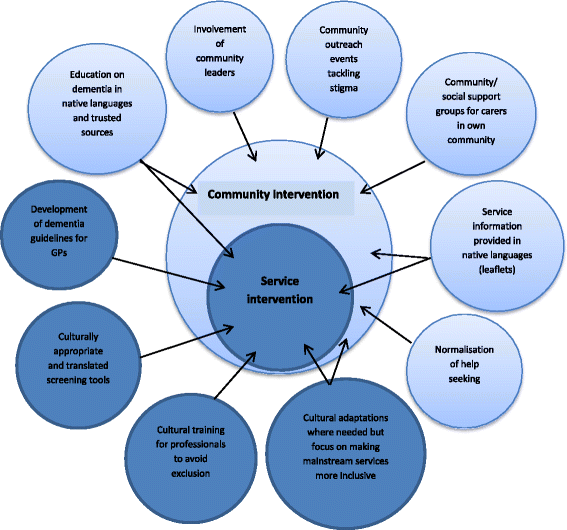Barriers and facilitators in accessing dementia care by ethnic minority groups: a meta-synthesis of qualitative studies
- PMID: 28854922
- PMCID: PMC5577676
- DOI: 10.1186/s12888-017-1474-0
Barriers and facilitators in accessing dementia care by ethnic minority groups: a meta-synthesis of qualitative studies
Abstract
Background: It is estimated that there are about 25,000 people from UK ethnic minority groups with dementia. It is clear that there is an increasing need to improve access to dementia services for all ethnic groups to ensure that everyone has access to the same potential health benefits. The aim was to systematically review qualitative studies and to perform a meta-synthesis around barriers and facilitators to accessing care for dementia in ethnic minorities.
Methods: Databases were searched to capture studies on barriers and facilitators to accessing care for dementia in ethnic minorities. Analysis followed the guidelines for meta-ethnography. All interpretations of data as presented by the authors of the included papers were extracted and grouped into new themes.
Results: Six hundred and eighty four papers were identified and screened. Twenty eight studies were included in the meta-synthesis. The analysis developed a number of themes and these were incorporated into two overarching themes: 'inadequacies' and 'cultural habitus'.
Conclusions: The two overarching themes lend themselves to interventions at a service level and a community level which need to happen in synergy.
Trial registration: The review was registered with PROSPERO: CRD42016049326 .
Keywords: Access; Barriers; Dementia; Ethnicity; Facilitators; Meta-ethnography; Minority; Review.
Conflict of interest statement
Ethics approval and consent to participate
Not applicable.
Consent for publication
Not applicable.
Competing interests
The authors declare that they have no competing interests.
Publisher’s Note
Springer Nature remains neutral with regard to jurisdictional claims in published maps and institutional affiliations.
Figures
References
-
- US Census Bureau. Statistical abstract of the United States: 2012. Washington, DC: US Census Bureau; 2011. Report No.: 131st ed.
-
- All Party Parliamentary Group on Dementia . Dementia does not discriminate: the experiences of Black, Asian and minority ethnic communities. London: Alzheimer’s Society and the House of Commons All-Party Parliamentary Group (APPG) on Dementia; 2013.
-
- Luengo-Fernandez R, Leal J, Gray A. Dementia 2010: the prevalence, economic cost and research funding compared with other major diseases: a report prepared by the health economics research Centre. Oxford: University of Oxford for the Alzheimer’s Research Trust; 2010.
-
- Travers T, Tunstall R, Whitehead C. Population Mobility and Service Provision: A report for London Councils. London: LSE; 2007.
Publication types
MeSH terms
LinkOut - more resources
Full Text Sources
Other Literature Sources
Medical



